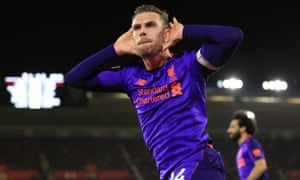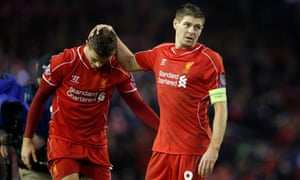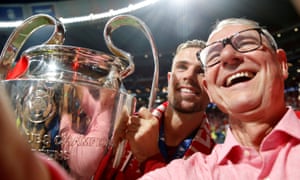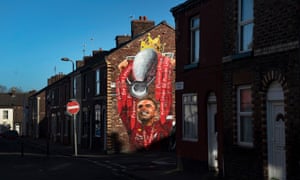At the end of a dark year like no other, and the start of a new one that will complete a decade of his life at Liverpool, Jordan Henderson is in a mood to pause and reflect. The Liverpool captain has family and friends who work for the NHS on the Covid-19 frontline. Sometimes they have held the phones and tablets which offer the only way for people who are dying to say goodbye to those they love.
His father, whom the NHS helped to save during a long battle against cancer, has been shielding and Henderson did not see much of him last year. This helps to explain why he started and drove the crisis fund that raised millions of pounds from Premier League footballers for the NHS.
Having just returned home after a morning of training, amid the blurring end-of-year fixtures, Henderson is engaging company even when addressing the brutal impact of 2020. “I think it has,” he says when asked whether the year has changed him. “It certainly puts things into perspective. Not that I ever take stuff for granted but it reiterates what is important – family and health. That’s all that matters. You’ve got to enjoy life while you can and try not to get too down. But it’s been difficult for everyone because of the virus. Hopefully we can see the other side very soon but a lot of people are struggling, a lot of people have died, and it’s affected us all. All me and the other lads [his fellow club captains who worked on the fund] tried to do was help make a difference.”
On the field, despite the absence of fans, Henderson led Liverpool to their first league title in 30 years. He epitomised the imperious self‑belief and hard-running zeal of the champions. His Player of the Year award, voted for by the country’s football writers, was followed by second place behind Lewis Hamilton in the BBC Sports Personality of the Year poll.
The plaudits have replaced the criticism and doubts which once hounded Henderson. Yet he insists his hunger to improve remains undiluted. He points out that, as Liverpool play Southampton away on Monday night, the same fixture in April 2019 represented a turning point. Henderson rose from the bench and produced a commanding display as Liverpool recovered from conceding an early goal to win 3-1. Their captain, striving to establish himself as a much more attacking presence, proved he could play in the advanced midfield role he craved.

Of course, moments of personal crisis seem more fascinating to those of us who did not live through them. But Henderson responds to questions about the adversity he overcame in a way which suggests his emotions are still vivid. In June 2011, when he joined Liverpool from Sunderland for £20m, he was the Fenway Group’s first major signing following their takeover. Fourteen months later, as hard as it is to imagine now when considering Henderson’s importance to the club, Liverpool wanted to sell him to Fulham in a swap deal with Clint Dempsey.
“That was a difficult moment I remember very clearly,” Henderson says of a time which reduced him to tears. “We were preparing for a [Europa League qualifying] game against Hearts at Anfield. We met as normal in the [Hope Street] hotel and I got a knock on my door saying the manager wanted to speak to us. To be fair to Brendan Rodgers, it was really just a conversation. It was an opportunity [to leave for Fulham] I didn’t want and I didn’t like. I still felt I had an awful lot to give.
“But I was in a very dark place at that time. It made us a lot stronger and a lot wiser later on and, without that, you never know what could have happened. So I really cherish them moments because you need setbacks, you need adversity. You get back up, and it makes you stronger because you want to prove people wrong. Ever since that day I had something in me. I needed to prove to the manager I would get in his team eventually. I’d do absolutely everything to be in his team, this football club, and I’d prove them wrong. In the end I did.”
Henderson explains that he and his wife, Rebecca, remained as close as ever during this tumultuous period but that “it was difficult because I didn’t like mixing family with football”. He says: “When I was coming home, back then, I wasn’t in a great mood a lot of the time. I was still very young and learning how to deal with situations like that. But I was so focused on what I needed to do. I needed to keep working, keep getting better, keep getting stronger in the gym, working around the clock, doing things other people weren’t doing, just to be given an opportunity. So, for me, all the focus was on what I love doing – playing football and being the best I can be. Rebecca has always been there for me but, yeah, it was a difficult period.”
Steven Gerrard told me, when we worked on his autobiography, that Henderson’s mum even approached him to share her concern. “She was worried for her boy,” Gerrard said. “He was a little lost. The move was initially too big for him.” While he joked about feeling very old because Henderson once had a poster of him on his bedroom wall, Gerrard was convinced the club had found his successor. Stressing that Henderson was one of the Liverpool players “I cared about most”, Gerrard reassured his teammate’s anxious mother.
He promised Liz Henderson he would look after her boy but, also, that he had been watching Jordan closely. “I know he’ll be fine,” Gerrard said before emphasising that Henderson would become “a vital player for the club”.

Did Henderson share that conviction eight years ago? “I don’t think you ever know what’s going to happen. When I first signed I was very young and I knew it was going to be tough. But I always wanted to test myself and I knew, by going to Liverpool, I would become better. But it took a little time.”
Even as a key presence in the team, when Liverpool came so close to winning the league in 2014, Henderson was tested. His father, Brian, had been diagnosed with throat cancer a few months earlier. “It was a shock,” Henderson recalls. “I didn’t see him for at least five months because he didn’t want to see us when he was having treatment. I kept my head down, kept playing, because I knew him watching and us winning could help. So that’s where my energy went and you’d be surprised how quick six months went. My dad was diagnosed towards the back end of January so, when I was playing, I was just so free and doing everything I could to lift him.”
Few people knew what Henderson was facing then and he reveals that he spoke often to Steve Peters, the sports psychiatrist. “My dad was ill and when we were close to winning the league I spoke to Steve quite regularly. I also did when he was with England, so I had a good couple of years of talking to Steve. It made a big difference.
“A lot of people deal with stuff like this and it made us grow up even quicker and I learnt a lot. In a way it made my dad stronger and I feel it changed him for the better. He enjoys living life even more now than he already did. If you get through that you can have a positive outlook but for other people, unfortunately, sometimes it’s not a happy ending.”
On the night Henderson lifted the Champions League trophy in June 2019 he and his father shared a tearful embrace on the pitch which completed a profoundly moving celebration. Apart from his dad surviving cancer, Henderson finally felt accepted at the pinnacle of football. Yet just seven weeks earlier he had been a substitute against Southampton and still battling to move beyond the critics and doubters as he played more as a No 8 than a deeper-lying No 6.

“That game was a little turning point,” Henderson says. “Even though I performed well before that, I felt that was the start of playing in a slightly different position. I could bring something different to the team and from that point I felt a lot more confident. I performed much better and more consistently.
“When the manager [Jürgen Klopp] first came [in October 2015] it was difficult for me because I was injured. I kept getting niggles so it took a while to get the real me and my rhythm back. And then I began to play in a deeper role and that is thanks to Jürgen, because I don’t think many people would have seen how I could do that role. There were times when I wasn’t performing well. Then you would question if I was good enough. But I had confidence in the manager and kept working and I matured. I’m really grateful for having that opportunity because my all-round game has improved defensively and offensively.”
Was Klopp easily convinced when Henderson asked to play in a more attacking position? “When we signed Fabinho, a natural defensive midfield player, I felt that was a good thing for me because I could play a little higher up. So when I had the conversation with the manager he was very open. But I don’t think he was going to play us there straightaway. Not long afterwards I was on the bench at that Southampton game before I came on as an attacker and managed to score. I’ve matured even more since then. At the end of last year I played more as an 8, but with certain injuries I’ve had this season I’ve played a little deeper again. I feel I can contribute to both positions.”

Liverpool return to St Mary’s top of the table and remain favourites to retain the title. “The past few years we’ve proved how good we can be and now it’s about improving, working as hard as possible, wanting more and giving absolutely everything. We’re in a good position but the Premier League can change very quickly. But that hunger and desire will always be there for me and the team.”
Against the pandemic’s grim backdrop of rising rates of infection and death, Henderson stresses that the work his cousin, and other friends, do in the NHS continues to occupy his thoughts. “You hear stories all the time of what they’re doing, what they’re going through, and it’s really tough. They just keep going on the frontline, but there will come a time where the effects may be felt further down the line. It’s important we plan for that now and help them as much as possible because some of the stuff they’ve been doing is incredible.
“People were dying and their families weren’t allowed at the hospital. So you want to be there to hold the iPad or iPhone for them to say goodbye to their family. I found it really tough hearing those stories. People on the frontline see some horrendous sights and so the least we can do is try and support them and help them prepare for what may come when this all stops.”
The pandemic has also meant that Henderson did not see much of his father in 2020. “He’s very high-risk and has to be careful. When the [first] lockdown eased a little I got a moment to see him and maybe once or twice after that. It’s not much but my dad’s in good spirits.”
Henderson is the figurehead of a Dry January campaign jointeamzero.com created by the team behind Budweiser Zero, a non-alcoholic beer. “It’s a really good campaign which fits me well because I don’t really drink alcohol,” Henderson says. “In 2020 lots of people, especially during lockdown, turned to alcohol for comfort to try and keep their mind off things. I’ve heard people talk about how they were drinking too much. So let’s all try and complete Dry January and stay focused and healthy and make a good start to the new year.”
The last nine and a half years at Liverpool “have flown by” for Henderson and he pauses again only when I ask whether, at the age of 30, he has begun to consider life without football. “I try not to do that. I hope I can play for a very long time, because the hunger, the desire and the love for the game is still there. I feel good physically and mentally. So I’m not thinking that far ahead. I’m just concentrating on doing the best I can over the next however many years for the club and for England and see where that takes me.”
Jordan Henderson spoke on behalf of Budweiser Zero. Sign up to Team Zero to join Henderson and take on Dry January together, and for a chance to win tickets to an England home game at jointeamzero.com







